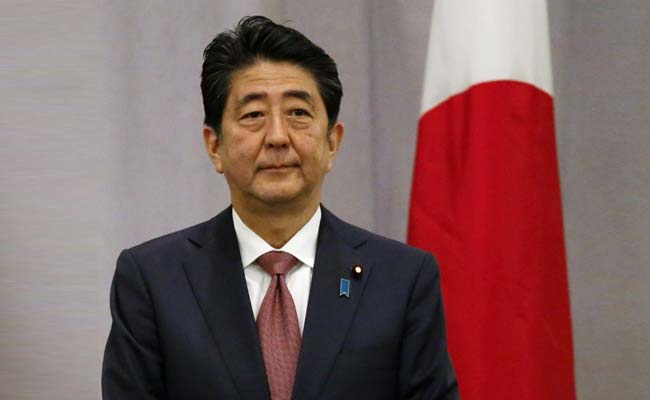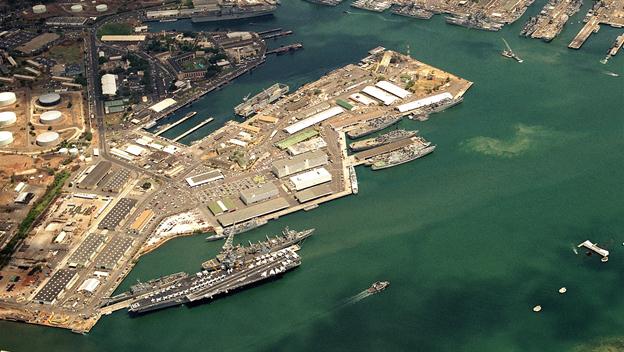TOKYO, Dec. 6 (Xinhua) -- Japanese Prime Minister Shinzo Abe's planned visit to Pearl Harbor later this month purportedly to remember the thousands killed by Japan's surprise attack on a naval base there is aimed at scoring bonus points from the public here, while showing the incoming U.S. administration that it still holds its ally in the highest regard, observers here said Tuesday.
Along with stating contentiously that "no apology would be offered" for the attack on Pearl Harbor, which was a catalyst for the United States to join World War II, Abe's top spokesperson, Chief Cabinet Secretary Yoshida Suga, said Tuesday that Abe's planned visit to Hawaii on Dec. 26 and 27 to mark the invasion by Japan 75 years ago, also has nothing to do with Barack Obama becoming the first serving U.S. president to visit Hiroshima.
Along with Nagasaki, Hiroshima was obliterated by a U.S. nuclear attack on Aug. 6, 1945, which brought an end to World War II following Japan's surrender.
"This visit is an opportunity to remember those who died in war, demonstrate a resolve that the horrors of war must never be repeated, and at the same time send a message about the reconciliation between Japan and the United States," Suga told a press conference Tuesday.
Suga added, however, that "The prime minister said everything there is to say about his feelings on the war in his statement in August last year to mark 70 years since the end of the war."
Many political watchers believed that Abe in his war statement squandered a golden opportunity to apologize for the actions of the Imperial Japanese Army and the barbaric acts of violence it unleashed during its reign of terror and occupation of numerous countries in Asia before and during World War II.
Calls from the international community had been rife for Abe to squarely face history in his war speech, and for his administration's actions to match his words, and reverse the reigniting of its military machine, as well as chart a course of constitutionally sanctioned peace and forge better relations with its regional neighbors brutalized by Japan during the war.
However, with the forcing of new security legislation through parliament, increased military spending and the expansion of Japanese forces' operational scope, as well as an ever-increasing right-leaning political stance of Abe and his ruling Liberal Democratic Party-led bloc, bellicose attitude towards its closest neighbors and rampant revisionism, observers have said Abe's Pearl Harbor gesture is a hollow one, aimed simply at scoring popularity points.
Japan launched a sneak attack on the Pearl Harbor naval base on the island of Oahu in Hawaii in 1941, killing some 2,400 U.S. military personnel and civilians.
While Abe's lack of apology for the attack will likely be nauseating for some U.S. military veterans, solidifying the Japan-U.S. alliance in these uncertain times is a central tenet of the duplicitous move, as the government also pointed out Tuesday.
Foreign Minister Fumio Kishida said that the visit by Abe would "serve as the culmination of the two leaders' efforts to build the Japan-U.S. alliance over the past four years."
But observers have pointed out that the visit may be geared towards helping boost his popularity rating here as Japan tries to show its solidarity with the U.S. ahead of president-elect Donald Trump taking the helm in the White House, against a backdrop of intimating that Japan should do more to take care of its own defense issues, or at least pay more for the U.S.'s services.
"Together with Obama's visit to Hiroshima, the Pearl Harbor visit will complete the reconciliation process and help smooth bilateral relations under any administration," Tsuneo Watanabe, a senior research fellow at the Sasakawa Peace Foundation, was quoted as saying.
In addition, if Abe's ratings here were to get a boost from the visit, then it would make it easier for Abe to call a snap election in January, despite his promises to the contrary, and catch opposition parties off guard, noted another prominent Japan-based political scholar.
Extending his grip on power in the more powerful lower house of parliament by preemptively minimizing losses to the opposition camp, would be another step towards Abe calling a national referendum on amending Japan's constitution and a key pacifist clause therein, political watchers have proffered.
While Abe's planned visit to Pearl Harbor may be deemed shrewd on one hand and disingenuous on the other, some political experts however believe the notion may be completely vacuous altogether, considering the current uncertain global political climate and foreign policy directions of the U.S. under a Trump presidency.
"The Pearl Harbor visit and Abe's commitment to the Japan-U.S. alliance are tantamount to giving a blank check to Trump despite the uncertainty over bilateral relations under his administration," said Koichi Nakano, a professor of international politics at Tokyo's Sophia University.











